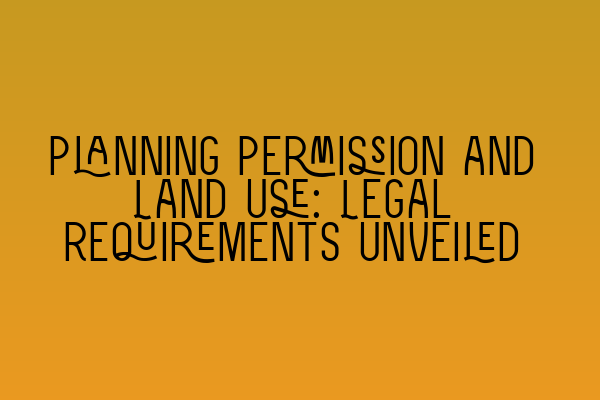Planning Permission and Land Use: Legal Requirements Unveiled
If you are considering developing a property or changing the use of land, it is essential to understand the legal requirements surrounding planning permission and land use. Failure to adhere to these regulations can lead to costly consequences, including fines, delays, and even the possibility of having to undo any unauthorized development. At SQE Property Law & Land Law, we are dedicated to providing expert legal advice on all aspects of property law, including planning permission and land use. In this blog post, we will unveil the legal requirements associated with planning permission and land use, ensuring that you are well-informed and prepared for any property development projects.
What is Planning Permission?
Planning permission, also known as development consent, is the legal process of obtaining approval from the local planning authority for a proposed development. It ensures that new developments or changes to existing properties comply with local planning policies and regulations. Planning permission is typically required for major developments, including new buildings, significant extensions, changes of use, and alterations to the external appearance of buildings. It is essential to note that some minor changes or developments may be exempt from requiring planning permission under certain circumstances. However, it is always advisable to consult with a qualified solicitor to determine the specific requirements for your project.
The Planning Process
The process of obtaining planning permission can be complex and time-consuming. It involves several stages, including the submission of planning applications, public consultation, and decision-making by the local planning authority. It is crucial to thoroughly understand the planning process to ensure that your application stands the best chance of being approved. Working with a solicitor who specializes in property law can significantly improve your chances of success and streamline the planning process for you.
Legal Requirements for Planning Permission
To obtain planning permission, you must demonstrate that your proposed development meets specific legal requirements. These requirements vary depending on the nature of the development, the local planning policies, and any other relevant factors. Here are some common legal requirements for planning permission:
1. Compliance with Local Planning Policies: Each local planning authority has their own set of planning policies and guidelines, which developers must adhere to. These policies consider various factors such as environmental impact, sustainability, heritage considerations, infrastructure requirements, and more. It is crucial to thoroughly research and understand the local planning policies before submitting your planning application.
2. Impact Assessments: Depending on the nature of your proposed development, you may be required to conduct impact assessments. These assessments evaluate any potential environmental, social, or economic impacts that your development may have on the surrounding area. Common assessments include environmental impact assessments, flood risk assessments, and traffic impact assessments.
3. Consultation and Notification: In some cases, you may be required to consult or notify specific parties about your proposed development. This can include neighboring properties, community groups, and other stakeholders who may be affected by your development. Consulting and notifying relevant parties is essential to ensure transparency and give them an opportunity to voice any concerns or objections.
4. Design and Access Statements: For some developments, especially those in conservation areas or involving listed buildings, you may be required to submit a design and access statement. This statement outlines the design principles and justifications for your proposed development, ensuring that it complements the surrounding area and meets specific design criteria.
5. Building Regulations Compliance: Planning permission is separate from building regulations approval. Even if you obtain planning permission, you will still need to comply with the applicable building regulations. Building regulations cover various aspects of construction, including structural integrity, fire safety, accessibility, energy efficiency, and more.
Consulting a Solicitor
Given the intricacies and potential legal pitfalls of the planning permission process, it is highly recommended to consult with a solicitor specializing in property law. A qualified solicitor can guide you through the entire process, ensuring compliance with all legal requirements and increasing the likelihood of a successful planning permission application.
At SQE Property Law & Land Law, our team of experienced solicitors has a deep understanding of planning permission and land use regulations. We can provide tailored advice and representation for all your property development needs. So if you require assistance with planning permission or any other property law matter, don’t hesitate to contact us today.
Stay Informed and Prepared
Understanding the legal requirements associated with planning permission and land use is crucial for anyone involved in property development. By being aware of these requirements and seeking the guidance of a qualified solicitor, you can navigate the planning process effectively and achieve success in your development projects. Remember, compliance with the law is essential to avoid unnecessary complications and legal issues down the line.
For further guidance on the SQE exams and preparation, consider checking out these related articles:
– SQE 1 Practice Exam Questions
– SQE 1 Practice Mocks FLK1 FLK2
– SQE 2 Preparation Courses
– SQE 1 Preparation Courses
– SRA SQE Exam Dates
In conclusion, obtaining planning permission and adhering to the legal requirements surrounding land use is essential for any property development project. By working with a qualified solicitor, understanding the planning process, and complying with local planning policies, you can navigate the complexities of obtaining planning permission and ensure a successful outcome for your development. Stay informed, stay prepared, and seek professional guidance when necessary.
